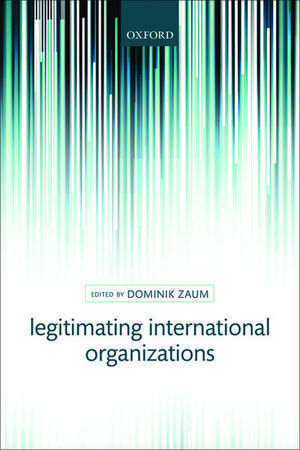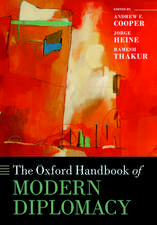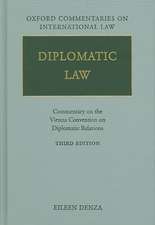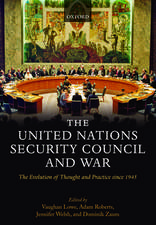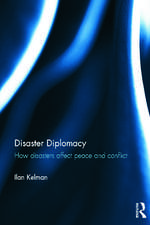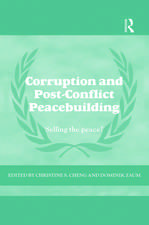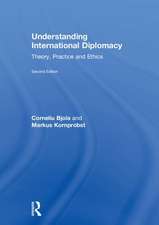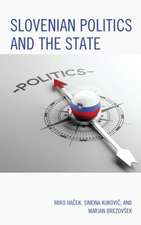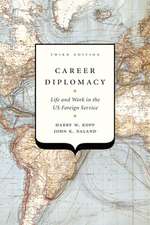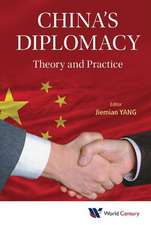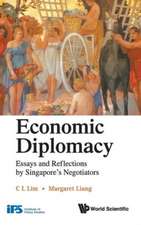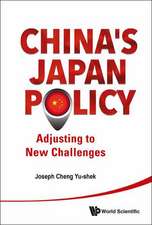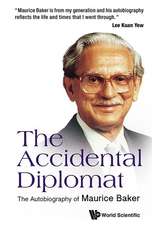Legitimating International Organizations
Editat de Dominik Zaumen Limba Engleză Hardback – 26 sep 2013
Preț: 686.51 lei
Preț vechi: 985.97 lei
-30% Nou
Puncte Express: 1030
Preț estimativ în valută:
131.36€ • 137.15$ • 108.72£
131.36€ • 137.15$ • 108.72£
Carte tipărită la comandă
Livrare economică 24-31 martie
Preluare comenzi: 021 569.72.76
Specificații
ISBN-13: 9780199672097
ISBN-10: 0199672091
Pagini: 272
Ilustrații: 1 Figure
Dimensiuni: 162 x 240 x 23 mm
Greutate: 0.54 kg
Editura: Oxford University Press
Colecția OUP Oxford
Locul publicării:Oxford, United Kingdom
ISBN-10: 0199672091
Pagini: 272
Ilustrații: 1 Figure
Dimensiuni: 162 x 240 x 23 mm
Greutate: 0.54 kg
Editura: Oxford University Press
Colecția OUP Oxford
Locul publicării:Oxford, United Kingdom
Recenzii
This is a welcome volume - it gives a comprehensive examination of the intersection between international politics, institutions and legitimation. Conceptually, it addresses legitimacy and legitimation with nuance and care, and then applies them empirically to study a wide range of international institutions. That international organizations rely on and trade in legitimacy and legitimation is by now a truism. The contributors go beyond merely asserting that international organizations are involved in legitimation politics and instead provide detailed case studies that show how they do. Across an impressive range of institutions, they examine legitimation around real-world controversies in international institutions.
As the role of non-state actors (NGOs, new media, etc.) in influencing international relations has increased, the perceived legitimacy of international organizations has become a battle-ground. Even regional courts today criticize the decisions of the UN Security Council, whose remit in the UN Charter once seemed beyond challenge. Thus, while the legitimacy of international institutions today remains critical, in most cases it is in flux. Dominik Zaum and his highly qualified chapter authors do a terrific job of analysing the current state of play and suggesting strategies that international organizations would be wise to consider in seeking to buttress their credibility and to reinforce their sometimes faltering legitimacy. They play a key role in ordering international relations and in encouraging new forms of international cooperation. As citizens, we would be at much greater risk without them.
As the role of non-state actors (NGOs, new media, etc.) in influencing international relations has increased, the perceived legitimacy of international organizations has become a battle-ground. Even regional courts today criticize the decisions of the UN Security Council, whose remit in the UN Charter once seemed beyond challenge. Thus, while the legitimacy of international institutions today remains critical, in most cases it is in flux. Dominik Zaum and his highly qualified chapter authors do a terrific job of analysing the current state of play and suggesting strategies that international organizations would be wise to consider in seeking to buttress their credibility and to reinforce their sometimes faltering legitimacy. They play a key role in ordering international relations and in encouraging new forms of international cooperation. As citizens, we would be at much greater risk without them.
Notă biografică
Dominik Zaum is Reader in International Relations at the University of Reading, and a Senior Research Fellow in Conflict and Fragility at the UK's Department for International Development (DFID). His research focuses on the politics of international organisations, especially the UN, and on the political economy of international peace- and statebuilding efforts. His publications include The Sovereignty Paradox: The Norms and Politics of International Statebuilding (OUP, 2007), The United Nations Security Council and War: The Evolution of Thought and Practice Since 1945 (OUP, 2008), and Political Economy of Statebuilding: Power after Peace (Routledge, 2012).
